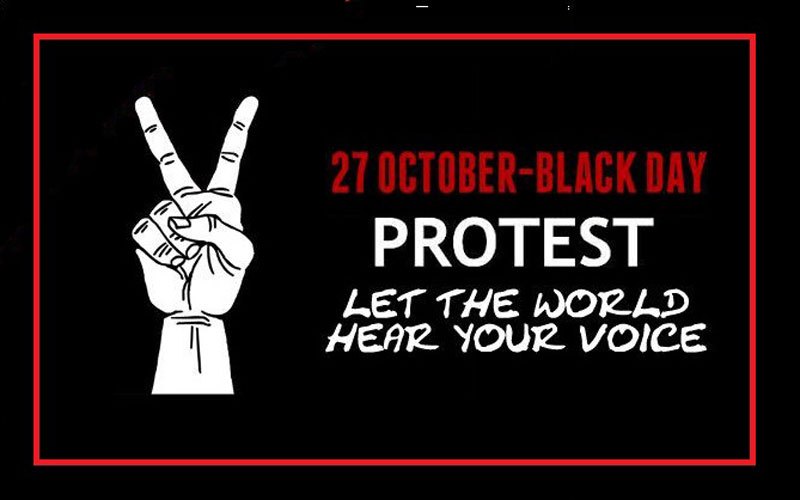Islamabad, Pakistan: Kashmiris living all over the world would observe October 27 as “Kashmir Black Day” which is also called as “Black Day for Kashmir”.
What we know about Black Day for Kashmir and why Kashmiris globally observe October 27 as Kashmir Black Day?

Historical Perspective of Kashmir issue and Black October 27 Day
In Jammu and Kashmir state, the ruler was a Hindu, while the population was overwhelmingly Muslim and wanted to join Pakistan. India consistently pressurized the Hindu Ruler to accede to India.
Capturing the opportunity, the people of Jammu and Kashmir rose against Hindu Raja him, forcing him to flee from Srinagar to Delhi and people of Kashmir formed their own government on 24th October, 1947 allover Kashmir.
An illegal and controversial document, the Instrument of Accession was signed on October 26, 1947 between Indian government and Maharaja of Kashmir.
Maharaja obtained India’s military help against Muslims who had already announced their independence in accordance with “Indo-Pak Partition” paper which allowed Kashmiri to decide their fate.
On 27th of October, 1947, the Government of India sent forces to snub Kashmiris and occupied a large part of Jammu and Kashmir but failed to occupy whole Kashmir Valley as Kashmiri Muslims strongly fought with Indian forces.
Situation became worsen due to presence of Indian forces in Kashmir valley and India and Pakistan were engaged in war.
Sensing defeat in Valley, India went to United Nations, asking UNSC to play its role to stop war.
Sensing the gravity of situation, the then Indian Prime Minister Jawahar Lal Nehru and Governor General Lord Mountbatten (Last Viceroy of British Raj in Indian subcontinent) solemnly declared that the final status of Jammu and Kashmir would be decided by the people of the State.
This same declaration was reiterated by India at the UN Security Council when the dispute was referred to UN under chapter 6 of the U.N Charter relating to peaceful settlement of disputes.
Since then, Kashmir issue is unresolved although following resolutions were adopted by UN Security Council and by other component of United Nations.
UN Resolutions over Kashmir Issue:
#38 (1948) adopted by the Security Council at its 229th meeting held on 17 January 1948.
#39 (1948) adopted by the Security Council at its 230th meeting held on 20 January 1948,
#47 (1948) adopted by the Security Council at its 286th meeting held on 21 April 1948,
#51 (1948) adopted by the Security Council at its 312th meeting held on 3 June 1948,
#80 (1950) adopted by the Security Council at its 470th meeting held on 14 March 1950,
#91 (1951) adopted by the Security Council at its 539th meeting held on 30 March 1951,
#96 (1951) adopted by the Security Council at its 566th meeting held on 10 November 1951,
#98 (1952) adopted by the Security Council at its 611th meeting held on 23 December 1952,
#122 (1957) adopted by the Security Council at its 765th meeting held on 24 January 1957,
#123 (1957) adopted by the Security Council at its 774th meeting held on 21 February 1957,
#209 (1965) adopted by the Security Council at its 1237th meeting held on 4 September 1965,
#210 (1965) adopted by the Security Council at its 1238th meeting held on 6 September 1965,
#211 (1965) adopted by the Security Council at its 1242nd meeting held on 20 September 1965,
#214 (1965) adopted by the Security Council at its 1245th meeting held on 27 September 1965,
#215 (1965) adopted by the Security Council at its1251st meeting held on 5 November 1965,
#303 (1971) adopted by the Security Council at its1606th meeting held on 6 December 1971,
#307 (1971) adopted by the Security Council at its 1616th meeting held on 21 December 1971.
What UN resolutions say about Kashmir issue?
- The complaint relating to Kashmir was initiated by India in the Security Council;
- The Council explicitly and by implications, rejected India’s claim that Kashmir is legally Indian territory;
- The resolutions established self-determination as the governing principal for the settlement of the Kashmir dispute. This is the world body’s commitment to the people of Kashmir;
- The resolutions endorsed a binding agreement between India and Pakistan reached through the mediation of UNCIP, that a plebiscite would be held, under agreed and specified conditions.
- The Security Council has rejected the Indian contention that the people of Kashmir have exercised their right of self-determination by participating in the “election” which India has from time to time organized in the Held Kashmir. The 0.2% turn out during the 1989 “elections” was the most recent clear repudiation of the Indian claim.
Pakistan continues to adhere to the UN resolutions. These are binding also on India.
Since illegal Instrument of Accession was signed between Maharaja of Kashmir and Indian government on October 26, 1947 and Indian forces occupied a part of Kashmir Valley, therefore Kashmiris all over the world observe October 27 as “Kashmir Black Day” or also call it “Black Day for Kashmir”.
